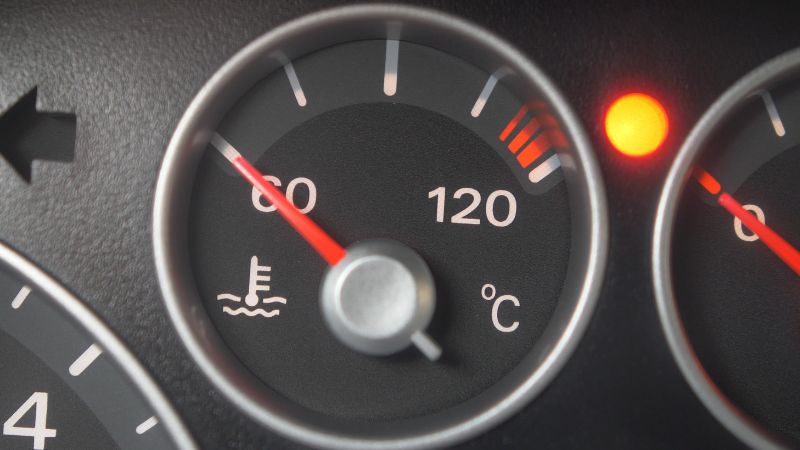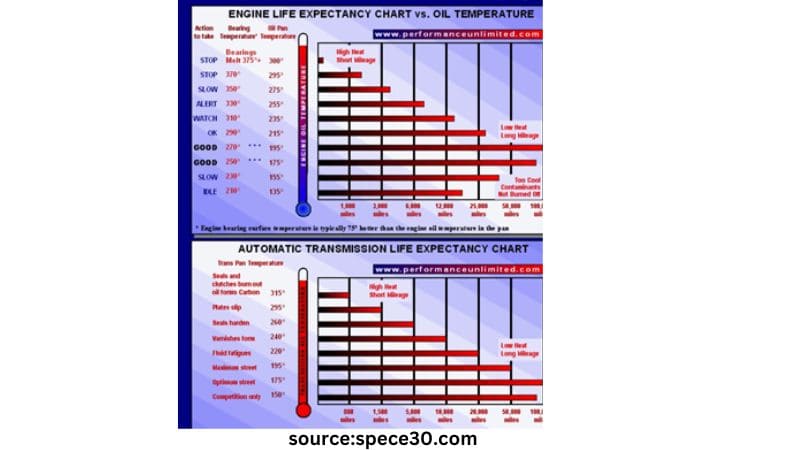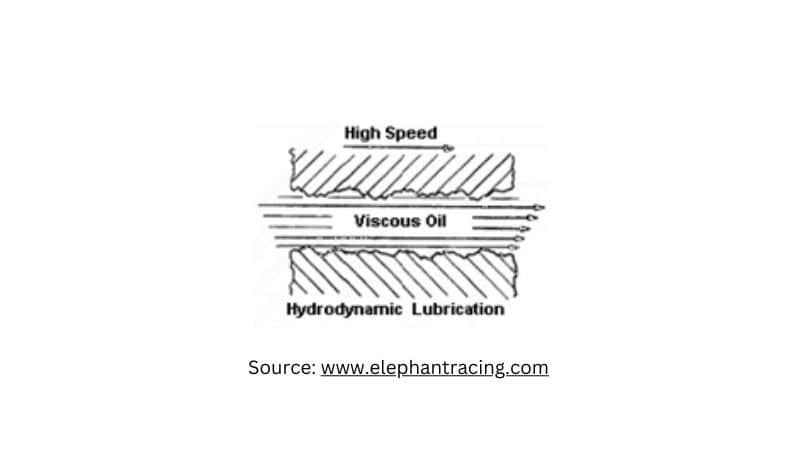You should heat your oil to a specific temperature to properly coat all your engine moving parts. If the oil is too cold or hot, your engine experiences performance problems. Oil temperature also has a natural effect on oil viscosity, which governs the lubrication of any machine.
Also, it can affect the oxidation rate of the oil, leading to sludge formation. However, though oil temp plays many roles, there needs to be more clarity about what ideal oil temperature is. Well, let’s discuss this topic in detail below:

Why Is Motor Oil Temperature Crucial?
Do you know about “cold start”? When engines are started cold or after idling, there is a slight oil coating to protect the engine from damage. However, modern oil innovations have also created cooling oil work for your car. Cooled oil is best for the engine and can lubricate everything in the machine.
Since cold oil is thinner, it can transfer the heat more quickly and allow the engine to reach operating temperature. As the oil heats up, it becomes more viscous, which makes it excellent at protecting the engine from damage. Viscosity also boosts the oil’s heat absorption properties. Moreover, you must heat the oil at about 220°F (104°C) to burn off deposits and water vapor.
If the engine never gets above 212°F (100°C), combustion byproducts, like sulfur, will mix with the oil. After that, it can make acid that damages engine parts. Finally, your oil needs to reach the right temperature to work. Most importantly, if your oil is too hot, it can break down more quickly.
So, What Is The Ideal Oil Temperature Of the Engine?
Many cars do not have a temperature range for oil but rather a pressure range. Furthermore, if your gauge doesn’t have numbers, the gauge is more or less showing the driver that something is happening. Actually, oil temperature is the most important and influential thing in engine lubrication.
Additionally, if the oil temperature is too high, your oil will break down and cause engine damage. Alternatively, low temperatures can thicken your oil and decrease engine performance. Nevertheless, Most experts agree that the ideal oil temperature range is between 230-260 °F. And the ideal oil temperature in Celsius is 110-127°C. However, this oil temperature range varies depending on the specific conditions. You know the ideal oil temperature of the engine. Now, we will talk about the average oil temperature for the machine.
What Is The Normal Oil Temperature For A Car Celcius?
Normal oil temperature depends on the vehicle fuel type that they use. For gasoline automobiles, it varies between about 110-126.6°C. But diesel-powered engines run slightly lower from it. So, the diesel engine oil temperature is around 93-110° Celsius. Actually, you should note that these temperature measurements are mostly ideal for conventional engine oils. Synthetic oils can tolerate temperatures higher than traditional, even up to 300F (149°C).
You also want to know what engine oil is formulated for high-end racing cars. You should use high-end engine oil for high-end engines because they only come for this type of engine. They can tolerate a temperature up to 350°F (176°C).
Now, you’re wondering if this changes for high-mileage cars, like the 5.3 L Vortec engine with over 75,000 miles? Basically, It entirely depends on the oil. Some high mileage vehicles use slightly more viscous oil, like 10W30 instead of 5W30. Thicker lubricants can be hotter, preventing corrosion in an older engine. Because of that, you may see high mileage oil temperatures around 260°F (127°C).
What Is The Ideal Oil Temperature For A Diesel Engine?
In most vehicles, diesel engine oil should have an operating temperature between 210-225 degrees Fahrenheit. So, it sounds like you’re within normal limits. But you should also check your owner’s manual for the correct specs for your engine. Everyone wants to be safe regarding coolant, oil, and engine temperatures. For a dual-purpose vehicle, to burn off all the accumulated water vapor and deposit oil, temperatures should be 220°F.
The water will mix with the sulfur if the engine sump temperature barely exceeds 212 degrees. For that reason, it forms acids that can eventually damage the bearings. As for ultimate power potential, the hot oil and cold water make more power in most engines. Cold oil causes excessive friction on the cylinder walls and bearings.
A quality traditional engine oil can withstand oil sump temperatures up to 250° but begins to break down above 275°. Even in the short term, you don’t want oil temperatures below 200° regularly when changing oil frequently.
How Hot is Too Hot For Oil?
Whether using mineral-based or fully synthetic oil, you should know when the oils begin to break down. Conventional motor oils can withstand up to 250°F (121°C) without much problem. But they begin to break down at about 275°F (135°C) and quickly exceed 300°F (149°C).
On the other hand, synthetic oil is not the same as conventional oil. A good synthetic will withstand high temperatures and oxidation for long periods. Some synthetic oils tolerate temperatures up to 450°F (232°C) depending on the brand and formulation.
How Do I Make Sure That My Engine Oil Temperature Is Normal?
Checking oil temperature and making sure it is at normal levels is essential. Many modern cars have built-in oil temperature sensors and the Thermometrics Oil Temperature Sensor (OTS). It indicates a warning light if your engine oil is out of average temperature. However, for a car that doesn’t have it, you can check the oil temperature using two techniques.
- Using a dipstick with a built-in thermometer:
Using this setup, it can be challenging to tell if your car’s engine oil is at normal temperature. In particular, you can get accurate results from it because it goes directly inside the oil pan.
- An infrared thermometer:
You can check if the oil temperature is normal with this method easily. By pointing the thermometer at the oil pan and checking the reading on the LCD screen, you can check. Yet, reading on a dipstick with a thermometer may not give you an accurate result.
Ideal Oil Temperature Chart
Accordingly, it would help if you always inspected the oil temperature regularly. It’s essential to check whether your oil is in the ideal range. In fact, you need always to keep your oil temperature at a perfect range. With an oil temperature gauge, you can know your engine’s ideal oil temperature range. Here is an interesting chart. It shows, “How hot is too hot?” for your motor oil and tow vehicle’s transmission. This also shows how a pattern of short travel can mess up the oil by not getting it hot enough.
Oil Temperature And Engine Life
A properly maintained engine can last over 300,000 miles if the oil temperature is in the optimal 180°-210°F range. As oil temperature increases, engine life decreases rapidly. If the temperature is too high, the engine will fail quickly. But why, you may wonder?
Oil temperature vs. Engine life

To understand it, we need to know what is happening on the moving parts surface. Under microscopic examination, the machined surfaces of a machine aren’t soft but rather have minute peaks and valleys.
Therefore, if you force these two surfaces to slide over each other, the high stains will come into contact. Resulting in resisting any sliding action. Contact causes deformation, scuffing, and subsequent tearing. This type of engine won’t work!
Though you don’t think all moving parts may last 300,000 miles, they do. It’s because, in regular operation, the metal moving parts don’t actually contact each other.
If the parts move relatively fast and present enough viscous oil, the oil fills the space and is dragged. Oil film surfaces float, and not any metal contacts happen. In addition, this condition is known as hydrodynamic lubrication.

To increase the life of your engine, you should keep the following:
Proper Oil Viscosity
As we know, viscosity is the ability to flow oil. Subsequently, viscosity controls the oil film thickness under hydrodynamic lubrication. With increasing temperature, oils lose their viscosity.
The oil film layer becomes progressively thinner as temperature rises and viscosity decreases. Eventually, the metallic irregularities start to contact and no longer have hydrodynamic lubrication. The conditions become more critical because of continuously increasing temperatures and continuous viscosity and film thickness decreases. Dramatically, your engine wear will increase.
Cool the Engine Oil
When the oil is at the right temperature, the moving parts work in hydrodynamic lubrication and are non-contact. Viscosity decreases with increasing temperature, and metal-to-metal contact starts. Engine wear is greatly accelerated. Mainly, if you equip your vehicle with an external oil cooler, it can help to increase engine life.
Proper Operating Temperature
Operating temperature is an essential factor in determining the life of a lubricant. Notably, if your operating temperature is high, your lubricant life will be short. The reason is that due to lubricant oxidizing, it changes its chemistry and lubrication properties. At higher operating temperatures, this oxidation process is faster.
FAQ (Frequently Asked Questions):
Q. What is the Optimum oil temperature?
Correct oil running temperature is probably more critical than water/coolant temperature. The optimum oil temperature for economy and power performance is acquired at 100–107 °C (210–225 °F). Up to 120°C (250°F) is fine if you can use a decent oil, but a little hotter. Some engine manufacturers believe that to keep things ‘safe, the oil should be kept around 80°C (175°F). This regulation isn’t just high enough for the best performance.
Q. What happens if my engine oil temperature is too hot or cold?
Cold motor oil can be highly contaminated because it does not contain the temperature necessary to destroy pollutants. Notably, if contaminants are trapped inside the engine, they can lose your engine’s power. Even so, it can wear off your engine’s components, like pistons and bearings, for the long run.
In contrast, If your engine oil temperature is too hot, it will mix with sulfur and make acids. Eventually, it can lead to damage to your bearings. Usually, your oil will typically not get hotter than 220°F. So, if your engine oil is very hot, it’s likely that your engine is overheating.
Q. Is 100 degrees too hot for engine oil?
Your engine coolant will be between 80° and 100° – depending on the environment, your engine, etc. Engine oil viscosity is measured in the US at 100C, and weight values are determined at that temperature. The European ISO standard specifies the weight at 40C. So, no car oil temperature of 100 degrees isn’t too hot.
A normally working engine would have an oil temperature of over 100C, possibly up to 120C. 100°C is 212°F, so if you mean 100°F, it’s nowhere near as hot. Actually, it would count as “not oil up” temperature. Modern oils operate over a much wider temperature range.
Q. What should the oil temperature be while driving?
Around town or everyday driving, engine water temperature should be between 85 and 95ºC for the best life and efficiency, power, etc. Hence, it can be 105ºC or slightly higher due to traffic or hills. But most cars won’t have temperature alarms or lights up to 115-130ºC. Therefore, ambient temperature doesn’t matter much in a modern car if you don’t live in cold temperatures.
Final Word:
In summary, every car’s engine oil must be at a specific temperature to function correctly. Temperature develops oil viscosity, protecting the engine from severe damage. More modern vehicles increase the engine operating temperature to improve performance and reduce emissions. They have an operating temperature of 90°C.
As we know, the ideal oil temperature for cars is 230-260°F (110-127°C). But there are examples where your vehicle may exceed 260°F (127°C). Stop driving the car if you notice that the oil temp light is on. With very hot oil, driving will be dangerous, especially when it is more desirable than 300°F (149°C).
Read Also: Can A Car Overheat With Low Oil?

